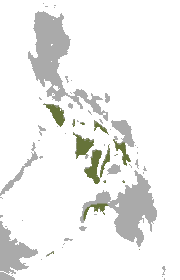Little golden-mantled flying fox facts for kids
Quick facts for kids Little golden-mantled flying fox |
|
|---|---|
| Conservation status | |
| Scientific classification |
|
| Kingdom: | Animalia |
| Phylum: | Chordata |
| Class: | Mammalia |
| Order: | Chiroptera |
| Family: | Pteropodidae |
| Genus: | Pteropus |
| Species: |
P. pumilus
|
| Binomial name | |
| Pteropus pumilus Miller, 1911
|
|
 |
|
| Little golden-mantled flying fox range | |
| Script error: The function "autoWithCaption" does not exist. | |
Script error: No such module "Check for conflicting parameters".
The little golden-mantled flying fox (Pteropus pumilus) is a special type of bat. It belongs to the Pteropodidae family. You can find this bat in countries like Indonesia and the Philippines. It naturally lives in warm, dry forests.
About This Bat
The little golden-mantled flying fox is one of the smallest fruit bats. It weighs about 200 grams, which is like two small apples. Its wings can spread out to about 76 centimeters wide.
Its body is covered in golden-brown fur. Often, its head and shoulders are a lighter color. This bat has claws on its feet. It also has a special claw, like a thumbnail, on the end of each wing.
Where It Lives
This bat makes its home in the Philippines and on Miangas island in Indonesia. In the Philippines, it lives on many islands. Some of these islands include Balut, Camiguin, Leyte, and Mindanao.
It can live high up in the mountains, sometimes as high as 1,100 meters. These bats are most often found on smaller islands. They prefer to live in old, untouched forests or well-grown new forests.
How It Behaves
The little golden-mantled flying fox likes to be alone. Unlike many other fruit bats, it does not live in big groups. Instead, it builds a nest and rests by itself in a tree.
This bat eats fruit, but we don't know exactly what kinds of fruit it prefers. Like other fruit bats, it helps forests grow. It does this by spreading seeds from the fruits it eats.
Life Cycle
These bats usually have babies in the autumn. Most often, a mother bat will have one baby each year. Sometimes, she might have two. The baby bat can take care of itself after about eleven weeks.
Its Future
The number of little golden-mantled flying foxes is going down. The biggest problems they face are losing their forest homes. People also hunt them for food.
This bat is listed in Appendix II of CITES. This means it has some protection. It also lives in several national parks. Even with these protections, the IUCN says it is "Near Threatened". This means it could become endangered if we don't help protect it.
 | Claudette Colvin |
 | Myrlie Evers-Williams |
 | Alberta Odell Jones |


